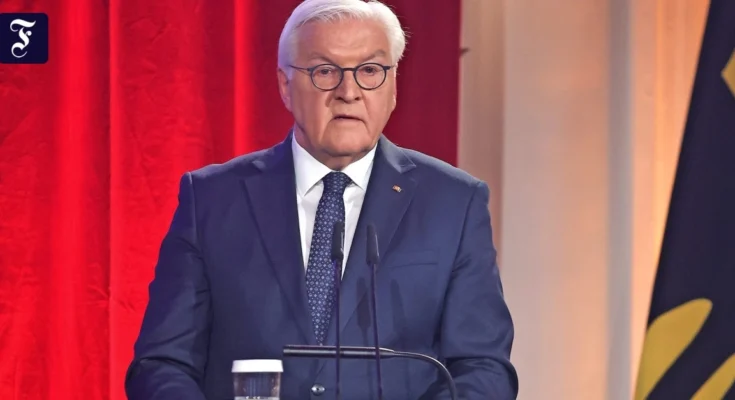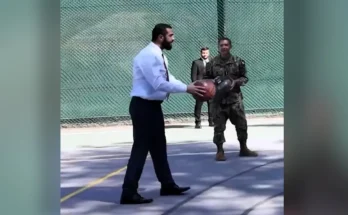The Federal President described November 9 in German history as a seismograph that showed us “vibrations, cracks in our society” and “threats to our democracy”. “We know what will happen if someone is ostracized, persecuted, tortured, and in the end even denied humanity,” said Frank-Walter Steinmeier. This reminds us of the Kristallnacht pogrom of November 9, 1938. November 9, 1918 is a reminder of how precious peace and democracy are, which are achieved with great difficulty and are never guaranteed forever. Finally, November 9, 1989, the fall of the Berlin Wall, which shows how strong you can be when you fight together for a goal.
If you read these seismographs correctly, Steinmeier said in his speech Sunday at Bellevue Palace, “then we can see what needs to be done.” And from the Federal President’s perspective, there is still much to be done. One of the key sentences in his speech was: “Never before in the history of our reunited country have democracy and freedom been attacked in such a way.” In his speech, he will then focus primarily on the threat to democracy posed by the AfD – without, of course, directly mentioning the party by name.
Head of State: The public seems uneasy
The Federal President was initially concerned by the rise in anti-Semitism in the country, which has never disappeared, but has always existed – “but anti-Semitism has increased dramatically in Germany since October 7, 2023,” said Steinmeier. “The attacks came from the right, left and center, and occurred among Muslim immigrants.” Steinmeier said: “We are all incapable of stopping this anti-Semitism.”
The Federal President described “major unrest in a society that appears uneasy”. He repeatedly faced questions about what would happen if extreme parties became stronger or if people with a history of immigration or Jews were no longer safe. “Could it be that we don’t learn from history?” You have to face the danger “without illusions”: “We must not fall into a new fascination with authoritarianism and then into a lack of freedom” – and after that everyone says they didn’t know.
Steinmeier explains what we can know and do from his perspective. He spoke about the greatest danger to democracy since reunification, referring to Russia’s war of aggression and saying that the country is currently “threatened by right-wing extremist forces that are attacking our democracy and gaining support from society.” But Steinmeier quickly added: “Democracy can defend itself!”
Warning about the AfD – without naming it
To achieve this goal, the Federal President first referred to the instruments of the rule of law, including the ban on parties: “Parties that take the path of aggressive anti-constitutionalism must always take into account the possibility of being banned.” Steinmeier also defended the exclusion of extremists from civil service or electoral positions. This is fundamentally undemocratic. “This is an expression of defensive democracy!”
The Federal President also warned political parties not to allow extremists to take power. “The bold attempt to tame the anti-democratic groups by giving them power failed not only in Weimar,” he said. “There should be no political cooperation with extremists.” Firewalls are also “porous if distance is not maintained from language, from hatred, from hostile images of right-wing extremists.”
Steinmeier said he knows that “the main burden of this demarcation is borne by center-right political forces.” This burden is indeed heavy, but they cannot bear it alone. That’s why he also appealed to political forces on the center left: “You also have a responsibility.” He spoke of “responsibility for appropriate action.” It is not helpful to “discredit every objectionable statement as ‘right-wing extremist’.” This is dangerous “when issues such as migration and security cannot be discussed because accusations of racism are directly leveled.” This means giving right-wing groups hegemony over issues of public concern. “This can’t be happening!” Steinmeier said.
Many other places also commemorate Sunday, November 9. Steinmeier’s predecessor in the presidency, Joachim Gauck, received criticism from the left over the weekend. In an interview he complained that despite a well-established reflex against far-right groups, addressing the anti-Semitism of immigrants, for example from Arab countries, had long been neglected. “Some people also have difficulty talking about left-wing anti-Semitism in Germany.” Gauck received support from the Central Jewish Council, among others.
The Federal President ended his speech on Sunday with the words: “Let us believe in ourselves! Let us do what must be done!” There was thunderous applause at Bellevue Palace.



